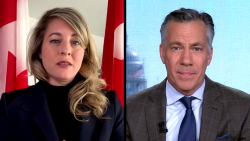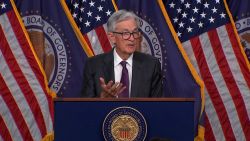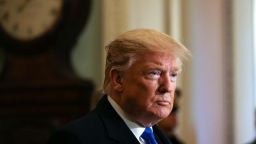A version of this story appeared in CNN Business’ Nightcap newsletter. To get it in your inbox, sign up for free,here.
Once upon a time, a brash outsider entered the Oval Office with a promise to “drain the swamp.” He brought in a posse of businesspeople, led by a leading industrialist, to work like “tireless bloodhounds” to root out inefficiencies in Washington’s vast bureaucracy.
It was 1982, and President Ronald Reagan’s Grace Commission began its quest to get rid of hundreds of billions of dollars in wasteful spending.
Much like President-elect Donald Trump’s“Department of Government Efficiency,” the advisory board led by entrepreneurs Elon Musk and Vivek Ramaswamy, the Grace Commission had no authority to implement changes, only to advise.
And after a couple of years of work, the Grace Commission’s 150-plus members persuaded Congress to enact exactly zero of its recommendations.
“You can’t find any evidence that they changed the growth of the government one iota,” Douglas Holtz-Eakin, president of the center-right think tank the American Action Forum, told CNN. “There are lots of little examples of successes” by the group, he said. “But I think you should ask Elon and Vivek what makes them different than the Grace Commission. How are they different than other things that were unsuccessful?”
In 2024, as in 1982, there’s a broad consensus that the federal budget is bloated and could benefit from a fresh set of eyes to make the government run more efficiently and save taxpayers’ money. Economists on the left and the right told CNN they’d welcome any good-faith effort to reduce the deficit and tackle government spending. But so far, neither Musk nor Ramaswamy seem to grasp the complexities of the $6.8 trillion US budget.
“We keep pretending the federal budget is like sitting at the kitchen table, figuring out the family’s finances,” said Holtz-Eakin, a former adviser to John McCain’s 2008 campaign and budget chief under President George W. Bush. “That’s a lie… It’s a fifth of the economy, and it’s very, very difficult to manage and to restructure. And they’re finding that out.”
The math problem
Musk and Ramaswamy will face an immediate math challenge with finding a way to severely slash spending — especially if they commit to the $2 trillion figure Musk has tossed around.
Roughly 60% of the federal government’s budget comprises what’s known as mandatory spending — primarily Medicare, Medicaid and Social Security. It would be political suicide to dramatically cut funding for those safety-net programs, which is why there is no appetite in Congress to do so. Trump has promised to protect Social Security.
Another 10% of the budget is spent on paying interest on Uncle Sam’s mountain of debt. That can’t be touched either, at least not without setting off a cataclysmic debt default and market meltdown.
That leaves around 30% of the budget that’s discretionary — but roughly half of that goes to defense spending, another area that would be challenging to dramatically cut.
“Removing $2T in annual spending will be exceedingly difficult without touching mandatory spending, which would require lawmakers to make the tough choices they have been either unwilling or unable to make,” Isaac Boltansky, director of policy research at BTIG, wrote in a recent report to clients.
Non-defense discretionary spending has already been dialed back, standing at the lowest level in modern history as a percentage of GDP, according to Moody’s Analytics chief economist Mark Zandi.
That’s why Zandi said he’s skeptical that focusing on government efficiency could generateeven $200 billion a year in annual savings, let alone $2 trillion. (Musk said in October that he could cut at least $2 trillion, but he didn’t specify if he meant annually or over a period of time).
“I’m all for efforts to improve the efficiency of government,” Zandi said. “But there’s no game-changing 60-yard touchdown pass here. It will be a lot of one- or two-yard runs.”
A two-pronged approach
In a Wall Street Journalop-ed last month, Musk and Ramaswamy offered a broad sketch of their vision to target “the $500 billion plus in annual federal expenditures that are unauthorized by Congress or being used in ways that Congress never intended.”
But how, exactly?
There’s a way, though it’s not always legal, for the president to defy Congress and just refuse to spend money lawmakers have allocated. It’s calledimpoundment.
“My threat level for DOGE’s recommendations making it through Congress is relatively low,” said Bobby Kogan, the senior director for federal budget policy at the Center for American Progress, a left-leaning policy research group. “My threat level for them doing some things illegally, unilaterally, is incredibly high.”
Trump has repeatedly said he would challenge the Nixon-era law that curtailed the president’s ability to block funding for projects approved by Congress. The DOGE bros are also on board, writing in their op-ed that they believe the Supreme Court would likely side with Trump.
A spokesperson for the Trump transition team didn’t respond to a request for comment.
It’s not clear how an impoundment strategy would play out. Newt Gingrich, the former House speaker and adviser to Trump,told the Washington Post last month that the administration would likely try a two-pronged strategy: asking Congress to approve drastic spending cuts, while testing the limits of its power to rescind funds unilaterally.
For example, if the White House wanted to freeze federal funds to schools with vaccine mandates, as the president-elect has suggested, the move would be challenged in court by the school or local government. It would be up to the courts to uphold or overturn that order, potentially holding up vital funds for months or even years.
“I do think that they’re probably going to lose (some cases) in the courts, but that is a very real path to chaos,” Kogan said.

























